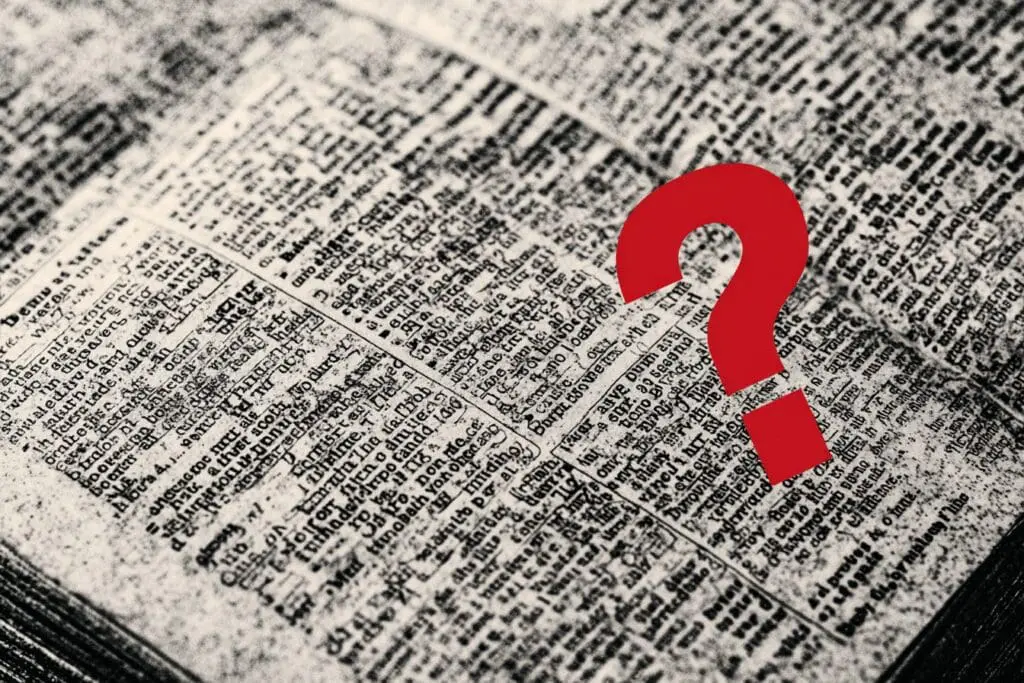Have you ever sat down to read your Bible, truly wanting to understand every single word, only to feel like something might be getting lost in translation? For many of us, the desire to grasp the full depth of the original Hebrew and Greek is a powerful motivator in our walk with Christ. It’s this exact desire that often leads people to the Amplified Bible. On the surface, it seems like the perfect solution—a Bible that gives you more. But as I’ve spent more time studying God’s Word, I’ve come to ask a critical question, and I’m not alone: What is wrong with the Amplified Bible?
The journey into this question isn’t about attacking a specific version of the Bible. Rather, it’s about being diligent, like the Bereans in Acts 17:11, who “examined the Scriptures every day to see if what Paul said was true.” We have a responsibility to handle the Word of God with care, and that means understanding the tools we use to study it. The Amplified Bible presents itself as a tool for clarity, yet for many, it can unintentionally create confusion and distance us from the very text we’re trying to understand.
This isn’t just an academic debate. The translation you choose as your primary source shapes your understanding of God, your theology, and your daily walk. Let’s explore the key issues together, not with a spirit of condemnation, but with a heart for truth.
More in Bible Category
What Is the Easiest Bible to Read
What Is the Best Translation of the Bible
Which Version of the Bible Is Easiest to Understand
Key Takeaways
- Interpretation vs. Translation: The Amplified Bible (AMP) often functions more like a built-in commentary than a direct translation, embedding interpretations directly into the scripture.
- Loss of Authorial Intent: The multitude of “amplified” meanings can obscure the single, intended meaning of the original author, making it difficult to understand the primary message of a passage.
- Subjective Word Choices: The additional words and synonyms are chosen by a translation committee, meaning you are reading their theological interpretations rather than just the biblical text itself.
- Hindrance to Study: Instead of encouraging deep study with tools like concordances and lexicons, the AMP can give a false sense of understanding, preventing readers from doing the rewarding work of personal discovery.
- Best Used as a Tool: The Amplified Bible should not be a primary study Bible. It is best used as a secondary resource, like a commentary, to see a range of potential word meanings before turning to more reliable study methods.
What Exactly Is the Amplified Bible and What Was Its Goal?
Before we dive into the issues, it’s only fair to understand what the Amplified Bible is and what it set out to accomplish. First published in its complete form in 1965 by The Lockman Foundation, the AMP was created with a noble goal: to help readers understand the subtle nuances of the original biblical languages.
The creators recognized that a single English word often can’t capture the full richness of a Greek or Hebrew term. For example, the Greek language has several words for “love” (like agape, phileo, and storge), while English primarily uses one. The Amplified Bible attempts to solve this by inserting multiple synonyms, definitions, and clarifications directly into the text, usually in parentheses or brackets.
The idea was to create a “self-interpreting” text that would function as a study tool for people who didn’t have access to or knowledge of the original languages. It was meant to bring out the “full meaning” of Scripture in a single volume.
On the surface, this sounds wonderful. Who wouldn’t want a Bible that helps them understand the text more deeply? The intention behind it was clearly to help believers. However, good intentions don’t always lead to the best results, and the very method used for amplification is where the most significant problems begin to surface.
Why Does Adding So Many Words to Scripture Become a Problem?
The central issue with the Amplified Bible lies in a crucial distinction: the difference between translation and interpretation.
A translation seeks to render the words and meaning of a text from its original language into a different language as faithfully as possible. Translators have to make choices, of course, but their primary goal is to represent what the original author wrote.
An interpretation, on the other hand, is an explanation of what the text means. This is the work of a pastor, a commentary, or a student of the Bible who, guided by the Holy Spirit, seeks to understand and apply the text.
The Amplified Bible blurs this line. By inserting multiple possible meanings, definitions, and theological expansions into the verses themselves, it moves beyond translation and becomes a running commentary.
How Can a Built-In Commentary Actually Cause Confusion?
Imagine you’re trying to have a direct conversation with someone, but another person keeps interrupting to explain what they think the first person might mean by every word they say. It would get confusing, right? You would start to wonder whose voice you were actually hearing.
This is the practical effect of the AMP. Instead of allowing the Word of God to speak clearly, it constantly interjects with a committee’s thoughts on what the words could imply. This creates a few specific problems for the reader:
- It obscures the primary meaning. The biblical authors, writing under the inspiration of the Holy Spirit, chose their words carefully. While a word might have a range of meanings, it typically has one specific meaning in its context. The AMP’s “shotgun approach” of listing multiple options can prevent the reader from ever landing on the most likely, intended meaning.
- It introduces theological bias. The extra words and definitions aren’t divinely inspired; they are the choices of the translators. Their own theological understanding, no matter how sincere, is inevitably woven into the text. You are no longer just reading the Bible; you are reading the Bible through the lens of The Lockman Foundation’s translation committee.
- It undermines the reader’s role. A huge part of spiritual growth is learning to study the Bible for ourselves. We learn to look at context, compare scripture with scripture, and use tools like a concordance. The AMP can create a dependency that short-circuits this process, making us passive receivers of information rather than active students of the Word.
Can We See an Example of How the Amplified Bible Changes a Verse?
Let’s move from the theoretical to the practical. Looking at a few verses side-by-side can make the issue crystal clear. We’ll compare the Amplified Version (AMP) with the English Standard Version (ESV), which is widely respected for its word-for-word accuracy.
Example 1: The Simplicity of the Gospel in John 3:16
This is perhaps the most well-known verse in the Bible. Its power is in its profound simplicity.
ESV: “For God so loved the world, that he gave his only Son, that whoever believes in him should not perish but have eternal life.”
The message is direct, powerful, and clear. Now, let’s look at the Amplified version.
AMP (2015): “For God so [greatly] loved and [dearly] prized the world, that He [even] gave His [One and] only begotten Son, so that whoever believes and trusts in Him [as Savior] shall not perish, but have eternal life.”
Notice all the added words in brackets. Are any of them “wrong”? Not necessarily. God certainly does “greatly” love and “dearly” prize the world. We absolutely should trust in Jesus “as Savior.”
But do these additions help? The argument is that they actually dilute the verse’s power. The simple, thunderous declaration “For God so loved the world” is cluttered with modifiers. The original text leaves the depth of “so loved” for the reader to comprehend through the rest of Scripture. The AMP tries to define that depth for you, and in doing so, it lessens the impact. It turns a profound declaration into a descriptive sentence.
Example 2: The Nature of Sin’s Wages in Romans 6:23
Here is another foundational verse concerning sin and salvation.
ESV: “For the wages of sin is death, but the free gift of God is eternal life in Christ Jesus our Lord.”
Again, the verse presents a stark and powerful contrast. Sin earns you something: death. God gives you something you didn’t earn: life.
AMP (2015): “For the wages of sin is death, but the free gift of God [is eternal life] through Jesus Christ our Lord.”
In this case, the classic Amplified versions added even more, sometimes specifying death as “spiritual separation from God.” While the 2015 version is tamer, the principle remains. The word “death” in the Bible is incredibly weighty. It includes physical death and spiritual death (separation from God). A good student of the Bible learns this by studying the concept throughout Scripture.
The AMP’s approach of defining it for you within the verse can prevent you from doing that important theological work. It gives you the answer before you’ve had a chance to even ask the question, which is not always the best way to learn.
For a deeper dive into the principles of Bible translation and the challenges different versions face, Dallas Theological Seminary offers some excellent insights on their website. You can explore their resources on Bible study, like this article: What is the Amplified Bible and is it a good translation for Bible study?
Whose Voice Are We Truly Listening To?
This brings us to one of the most personal and important questions in this discussion. When you open your Bible, who are you expecting to hear from?
As followers of Jesus, our answer is simple: We want to hear from God. We believe that the Bible is God’s inspired, inerrant Word. We also believe that the Holy Spirit is our guide, illuminating the Scriptures for us as we read (John 16:13).
The problem is that the Amplified Bible inserts another voice into that sacred process. It’s the voice of the translation committee.
Does the Amplified Bible Undermine Our Reliance on the Holy Spirit?
When I first came to faith, I was hungry to understand the Bible. I remember the joy of discovering something new in a passage I’d read a dozen times before. It felt like the Holy Spirit was personally teaching me, connecting dots across different books of the Bible. That process of discovery was, and still is, vital to my spiritual growth.
The Amplified Bible, with its built-in definitions, can unintentionally sideline the role of the Holy Spirit as our primary teacher.
- Instead of praying for wisdom to understand a difficult word, we simply accept the options given in the parentheses.
- Instead of learning to use a lexicon to see a word’s original meaning, we trust the committee’s summary.
- Instead of wrestling with a passage and allowing the Spirit to reveal its meaning in His timing, we are handed a pre-digested interpretation.
It creates a critical distance between the reader and the raw text of Scripture. It’s the difference between being given a fish and being taught how to fish. The Amplified Bible gives you a fish—a very specific, pre-cooked fish prepared by others. A more formal translation like the ESV, NASB, or KJV gives you the fishing rod and invites you to come to the water with the Holy Spirit.
What Are the Practical Dangers for Our Christian Walk?
This isn’t just a matter of preference; using the AMP as a primary Bible can have real, practical consequences for a believer’s doctrine and spiritual health.
How Can the AMP Affect Personal Doctrine and Study Habits?
Here are some of the potential pitfalls:
- Difficulty with Scripture Memorization: The sheer number of extra words in the AMP makes memorizing verses incredibly difficult. Scripture memorization is a powerful spiritual discipline, and the AMP is a structural barrier to it.
- “Choose Your Own Adventure” Theology: When presented with multiple words or phrases for a single concept, it’s human nature to gravitate toward the one we like best or the one that fits our preconceived ideas. This can lead to a distorted understanding of a passage, as we might ignore the most accurate meaning in favor of a more palatable one.
- A False Sense of Deep Study: A person can spend an hour reading the AMP and feel like they’ve done an intense, deep study because they’ve read so many extra words. In reality, they may have understood less of the author’s original intent than if they had spent that same hour with a more direct translation and a simple notebook.
- Problems in Group Bible Study: When one person is reading from the AMP and everyone else is using a different translation, it can quickly derail a discussion. The AMP reader’s version will be so different and contain so much extra commentary that it becomes difficult to stay on the same page.
So, Should I Just Throw My Amplified Bible Away?
After all of this, it’s easy to think that the Amplified Bible is “bad” and should be completely avoided. But that’s probably not the most balanced conclusion. The key is to understand what kind of tool it is and how to use it properly.
The Amplified Bible is not a translation. It is a commentary.
If you think of it that way, its proper role becomes much clearer. You would never use only a single commentary to study the Bible, and you certainly wouldn’t read the commentary’s words as if they were Scripture itself.
How Can You Use the Amplified Bible in a Healthy Way?
If you already own an Amplified Bible, you don’t need to throw it out. Instead, you can change the way you use it.
- Get a Solid Primary Bible. First and foremost, choose a reliable, mainstream translation for your daily reading, study, and memorization. The ESV, NASB, CSB, and even the NIV are all excellent choices that have teams of scholars dedicated to faithfully translating the original languages.
- Use the AMP as a Reference Tool. Once you’ve read a passage in your primary Bible, you can then turn to the AMP to see a range of possible meanings for certain words. Think of it as a brainstorming tool. It might show you a nuance you hadn’t considered.
- Always Verify with Better Tools. If a word in the AMP sparks your interest, don’t stop there! Take that as your cue to do some real study. Use a tool like the Blue Letter Bible or a physical Strong’s Concordance to look up the original Hebrew or Greek word. See for yourself what it means and how it’s used in other parts of the Bible. That is how true, lasting understanding is built.
Final Thoughts: Pursuing the Pure Word
Our journey as Christians is a journey toward Christ, and one of the primary ways we know Him is through His Word. The goal is always to get closer to the true, intended meaning of the Scriptures. We want to remove the barriers between us and the voice of God, not add more.
The Amplified Bible, while born from a sincere desire to help, ultimately acts as a filter. It places a committee of interpreters between you and the inspired text. While it can be a helpful secondary resource to suggest avenues for study, it cannot and should not be the foundation of your biblical intake.
Let’s commit ourselves to the beautiful, rewarding, and sometimes challenging work of studying the Bible. Let’s choose a faithful translation, pray for the guidance of the Holy Spirit, and dive into the pure, powerful, and life-changing Word of God.
Frequently Asked Questions – What Is Wrong with the Amplified Bible

What is the best way to use the Amplified Bible, given its issues?
The Amplified Bible should be used as a study tool, like a dictionary, to explore possible meanings of words or verses; it should not be used as the primary Bible for daily reading because its interpretive additions can lead to misunderstanding and bias.
In what way does the Amplified Bible obscure the authorial intent?
By adding multiple options and interpretive phrases, the Amplified Bible can dilute the original intent of the writers by presenting many possible meanings instead of focusing on the single, carefully chosen words intended by the biblical authors.
How does theological bias affect the Amplified Bible?
The translation can be influenced by the beliefs of its translators, who add interpretive words based on their theological views, potentially pushing readers toward specific doctrinal views rather than presenting the original text neutrally.
Does the Amplified Bible improve clarity or create confusion?
While the Amplified Bible claims to clarify, its added words and notes often make the text more complicated and harder to read, causing confusion instead of clarity, especially because of frequent insertions and lengthy explanations within sentences.
What is the main problem with the Amplified Bible’s method?
The main issue with the Amplified Bible is that it combines translation with interpretation, meaning it adds personal opinions and theological notes into the text, which can influence the reader’s understanding rather than providing a straightforward translation.




